|
QoA Streaming Mass

To view a collection of all recent masses, please click
on the following link: Click Here
Advent Prayers: Click Here

Advent
Our Advent has only four weeks, but Tradition holds that
this period lasted four thousand years before Christ’s
coming. From the dismal day when Adam and Eve were driven
from Paradise until the silent and holy night when
Bethlehem was flooded with Heaven’s brightness, mankind
eagerly yearned for a Redeemer.
The first Advent was a time of gloom; hope was confined to
a small portion of the human race, the Chosen People, and
“even with them it was a hope frequently distorted by
false and worldly desires. Now we walk in the light of
faith; the Savior has come to earth. He lived and still
lives among us. Therefore, the Church expresses her joy
throughout the Advent liturgy.”
(Fr. Thomas Plassmann, OFM, From Sunday to Sunday, pp.
22-23.)
We know that Jesus was born in Bethlehem more than 2,000
years ago, but He must be born again in our hearts during
Advent. The graces that Our Lord merited for us are only
given to those who make themselves worthy of them. This
is the true meaning of Advent.
The spirit of Advent is meditation and reflection. For
this purpose the Church garbs the priest in the
penitential color of purple. She omits the Gloria and
flowers are not permitted on the altar during the Masses
of the season except Gaudete Sunday, the Third Sunday of
Advent. Centuries ago Catholics practiced fasting and
abstinence since the Church then considered Advent as a
time of penance. Although Advent is no longer a
penitential season, we must “make ready the way of the
Lord.”
Time seems to fly by so quickly that it leaves us in
dismay at its rapid passing. The end of this year is
making its hasty exit, and that of a new one is fast
approaching. This year’s door will soon be closed forever
behind us, and become part of an unchangeable past. The
past, with all its joys, sorrows, successes, failures,
hopes, disappointments, sunshine and shadow, is gone
beyond any hope of “re-doing” it.
Advent brings with it the hope of reform, renewal and
fresh endeavors. Holy Mother Church wisely sets this time
aside for us to look upon our past life and align and
redirect it once again along Christ’s path. Just as we
will be standing at the end of this single year, so too,
shall we one day be standing at the end of all our
allotted years, when we are on our deathbed.
We live in a world of strange delusions; the most fatal of
which is to imagine that we can consistently reject God’s
grace during our life and then, at the moment of our
death, turn over a new leaf and be saved. In his book,
Struggle Our Destiny, Father William Tobin writes, “There
have been miraculous deathbed conversions, it is true; but
they are few and far between.”
“In ninety-nine cases out of a hundred, much as you are
now, so in all probability you shall find yourself at the
hour of your death. This is a serious thought. If you
are not ready to die now, you will probably not be ready
at the moment you are to pass from hence. And you are not
going to pass this way again. You get no second chance.”
(pp.1-2.) There is no “do-over.”
The bedside of a dying man (or woman), who has been devout
and fervent during his life, is usually an inspiration to
those who see him passing. He dies fervently with the
name of Jesus on his lips. On the other hand, the bedside
of a dying man or woman whose faith has been dull, tepid
and apathetic, is one at which the dying man does not seem
to realize that his eternity is hanging in the balance,
and that the next hour or so will decide the outcome of
the fight between God and the demons for his soul.
During his life he had no keen appreciation of spiritual
things and he thought little about his immortal soul.
Careless in life, he is careless in death. Habitually
sinful in life, he most likely dies in his habitual sin.
Another reason why deathbed conversions are so rare is
that, when dying, a sick man is so worried about his poor
physical condition that he does not have the energy to
attend to the needs of his soul (regardless of what shape
it is in.) Further, friends and relatives often, in a
mistaken spirit of kindness, urge his doctors to give all
kinds of pain medication to relieve his situation, but
without ever attending to the needs of his soul. This
leaves his mind in a compromised position, and his will
weakened. The dying person finds that his impending death
is hardly a time for spiritual confrontation, especially
since he has not established a lifetime of spiritually
good habits.
The habit of a lifetime of sin cannot be shaken off in a
moment. In Holy Scripture we read of the difficulty of
change from the obstinacy of sinful ways. Jeremiahs
compares such difficulty to that of a leopard trying to
change its spots, for we read: “If the… leopard [can
change] his spots: you also may do when you have learned
evil.” (13:23) And Job says, [for your heart shall be] “as
hard[ened in sin] as a stone and as firm as a smith’s
anvil.” (41:15) Habitual sin cannot be laid aside in the
twinkling of an eye.
“Death changes few people. As you are now, so you shall
be, in all likelihood, at the hour of your death. If you
are not ready to face your Judge now, you shall not be
ready then.” (Tobin, 3.) You must do now what you would
wish to do then.
It would be wise to use the coming Advent and what remains
of this year to get your soul in order and to make a firm
resolution to live the rest of your life according to
God’s laws. So many of us spend a great deal of time
preparing for the worldly celebration of this season,
while neglecting the real preparation with which we should
be concerned. So many hours of each day are spent in
preserving and caring for our bodies, while, at the same
time, the soul is ignored. Barely a moment, if any, is
allotted for a morning offering; and television and
smartphone seem to cut short, or leave no time for morning
and night prayer or the daily rosary.
We are living in ominous times. You should take this to
heart in order to re-evaluate your spiritual life and make
sure it is going in the direction that will insure a
favorable judgment. The reason why habitual sin cannot be
conquered lost overnight is because we are creatures of
habit. Our habitual sins can, so to speak, cut grooves in
our soul. As a result, we rarely resist temptation and
usually follow the pathway of sin.
According to Father Tobin: “Education is a habit, virtue
is a habit, the skill of the [carpenter and the athlete]
are the result of habit. We can tie a knot in our shoe
laces without thinking because even that simple act has
become a habit… The [habitual] sinner, so to say, has
acquired a facility to commit sin, and, almost before he
is aware of it, his feet are skidding on the old, slippery
downward path, and his intellect and will cry ‘halt,’ in
vain.”
“He wants to do better, but his bad habits have gotten him
in their control. He who commits sin becomes the slave of
sin. And once you get the slave mentality, it is hard to
acquire the spirit of a freeman again.” (Tobin, 4.) This
is why, if your life has made you a slave of sin, there is
no reason to think that your death will be any different
unless you do something right now. For some, this may be
God’s last call of grace.
This brings us to the powerful verse in Hebrews 3:15 which
reads: “Today if you shall hear his voice, harden not your
hearts.” Now is the time to do something about your soul
if you are in danger of losing it. Now is the time for a
change of habit for the better.
Holy Mother Church constantly reminds us of the brevity of
life and the nearness of death, in order to impress on us
the folly of living only for the transient pleasures of
this world. She warns us to never lose sight of
eternity. Holy Scripture says, “Remember your last end
and you will never sin.”
As you will be at the end of this Advent, you will likely
be next year. Sanctifying grace is God’s most precious
gift. You can only persevere in sanctifying grace if you
develop the good habits of avoiding sin, daily prayer,
frequenting Holy Mass and the Sacraments, and by placing
God and His holy will first and foremost in our daily
lives. In this way, we will be watchful and therefore
ready whenever death comes upon us.
I’ll conclude with the following story. St. John Climacus
relates the following incident, of which he himself was an
eye-witness. “There was in the deserts of Egypt a
solitary [monk,] who after a long time lived a careless
life, neglecting to aspire after the perfection of his
state, and thought but little of the judgments of God.”
“In the course of time he became ill, and was soon at the
point of death. When he appeared to those around him to
be in his agony, God was pleased to show him in a vision
the state of his soul. During one whole night he seemed
to lie unconscious, and it was then that he saw how God,
in His mercy, had given him the grace of seeing how
terrible are His judgments on those who do not serve Him.”
10
“When in the morning he regained his senses, the thought
of what he had seen so filled his soul with fear that he
resolved to spend the rest of his life, if God would yet
spare him for a time, in doing the most rigid penance for
his past negligences.”
“His first words to those who had silently witnessed the
terrible agony of that night, among whom was St. John
Climacus himself, were: ‘My brethren, depart from me;
leave me alone.’ Then rising from his bed, weak though he
was, he closed the entrance to his… [room,] which he
resolved never to leave till the hour of his death.”
“For twelve years he lived there enclosed without speaking
to anyone, subsisting on bread and water which the
brethren brought him. He sat on the ground in silence,
meditating continually on what he had seen; he never moved
from that posture day nor night, and he kept his eyes
continually fixed on the heavens above him, while shedding
abundance of tears.”
“When at length it was evident that his last hour was
near, the brethren of the monastery broke open the door,
and stood before him. Then, as was then the custom among
them when death came to visit one of their number, they
besought him to say to them some words of edification
which they might afterwards call to mind. For a long time
he begged to be excused, but at length, yielding to their
continued pleadings, he said: ‘Forgive me, my brothers, if
I say to you only one word. Amen, amen I say to you, if
men only knew how terrible are the judgments of God, they
would never, never sin.’ Having said these words, he
calmly expired, leaving the solitaries penetrated with
great fear.”
(Rev. D. Chisholm, The Catechism in Examples vol. 1, pp.
194-195.)


|
Queen of
Angels Catholic Church in Santa Clarita,
California, is much like any Catholic church you
might have attended before the Second Vatican
Council occurred in the 1960's. This Council,
supposedly intended to bring about a genuine
spiritual renewal in the living of our Faith,
inaugurated liturgical changes that broke
drastically from the Church's sacred liturgy and
traditions of nearly 2,000 years. It
is because of these changes and the resultant
universal loss of faith among so many bishops,
priests, nuns and laity, that Queen of Angels
and chapels like this one are drawing more and
more interest from concerned Catholics all over
the world.
The pastor of Queen of Angels is Father Dominic
Radecki, CMRI, a priest belonging to the religious
Congregation of Mary Immaculate Queen . The bishop
and priests of the Congregation of Mary Immaculate
Queen (CMRI) offer only the Tridentine Latin Mass
in all the churches and chapels they serve.
Remaining faithful to all of the Church's
venerable teachings and traditions, Queen
of Angels Church reflects the stability and
endurance of truths and doctrines that will
never change with the times.
The faithful receive Holy Communion on their
tongues as they kneel at the communion rail in
humble adoration of the Real Presence of God.
Ladies wear head coverings and modest clothing out
of respect. The reverent silence in the House of
God indicates a living faith in Christ Who dwells
in the tabernacle.
We have a full schedule of activities at our
church. The Sacraments are administered exactly
the way they were before Vatican II: Baptism,
Confirmation, Penance, the Holy Eucharist,
Matrimony and Extreme Unction. Parish
organizations who attend Queen of Angels, ranging
from basic catechism instruction for the youth and
converts to the Faith, to our Confraternity of
Christian Mothers. For those who wish to lead a
more dedicated spiritual life, we have the
Confraternity of Mary Immaculate Queen. We invite
you to check out all of our parish activities on
this website.
We at Queen of Angels welcome visitors to our
parish at anytime of the year, but especially at
Christmas and Easter. Although the number of
parishioners has outgrown our small church,
newcomers are always welcome.
Each of our parishioners adds something unique to
the family atmosphere we think is very special
here at our church. Come and see it for yourself!
If you have not been to a Latin Mass in many
years, if you have never been to one at all, you
will be pleasantly surprised at what you find at
Queen of Angels. You will feel as if you have come
home, as indeed you have.
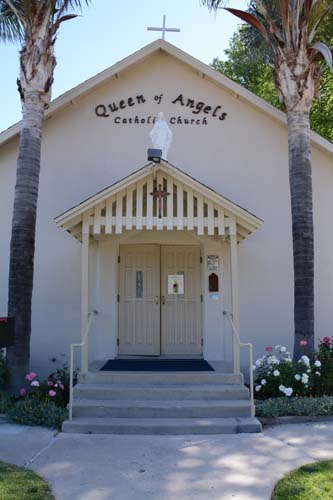
Queen of Angels Catholic Church

Prayer to the August Queen of Heaven
August Queen of Heaven, Sovereign
Mistress of the Angels, who didst receive from the
beginning the mission and the power to crush the
serpent's head, we beseech thee to send thy holy
angels, that under thy command and by thy power
they may pursue the evil spirits, encounter them
on every side, resist their bold attacks, and
drive them hence into the abyss of woe.
Most holy Mother, send thy angels to defend us and
to drive the cruel enemy from us.
All ye holy Angels and Archangels, keep and defend
us. Amen
O good and tender Mother Thou shalt ever be our
love and our hope.
Holy Angels and Archangels, keep and defend us.
Amen

Novena of Confidence
to the Sacred Heart of Jesus
(for family relations that have fallen away)
O Lord Jesus Christ, to Thy Most
Sacred Heart I confide this intention (silently
mention here the names you are praying for). Only
look upon me, then do what Thy Heart inspires. Let
Thy Sacred Heart decide. I count on it. I trust in
it. I throw myself on its mercy, Lord Jesus! Thou
wilt not fail me.
Sacred Heart of Jesus, I trust in Thee.
Sacred Heart of Jesus, I believe in Thy love for
me.
Sacred Heart of Jesus, Thy
Kingdom come!
O Sacred Heart of Jesus, I have asked Thee for
many favors, but I earnestly implore this one.
Take it, place it in Thy open, broken Heart, and
when the Eternal Father looks upon it, covered
with Thy Precious Blood, He will not refuse it.s
It will no longer be my prayer but Thine, O Sacred
Heart of Jesus. O Sacred Heart of Jesus, I place
my trust in Thee. Let me never be confounded.
Amen.

|
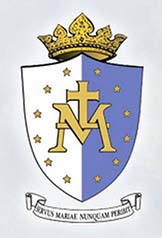
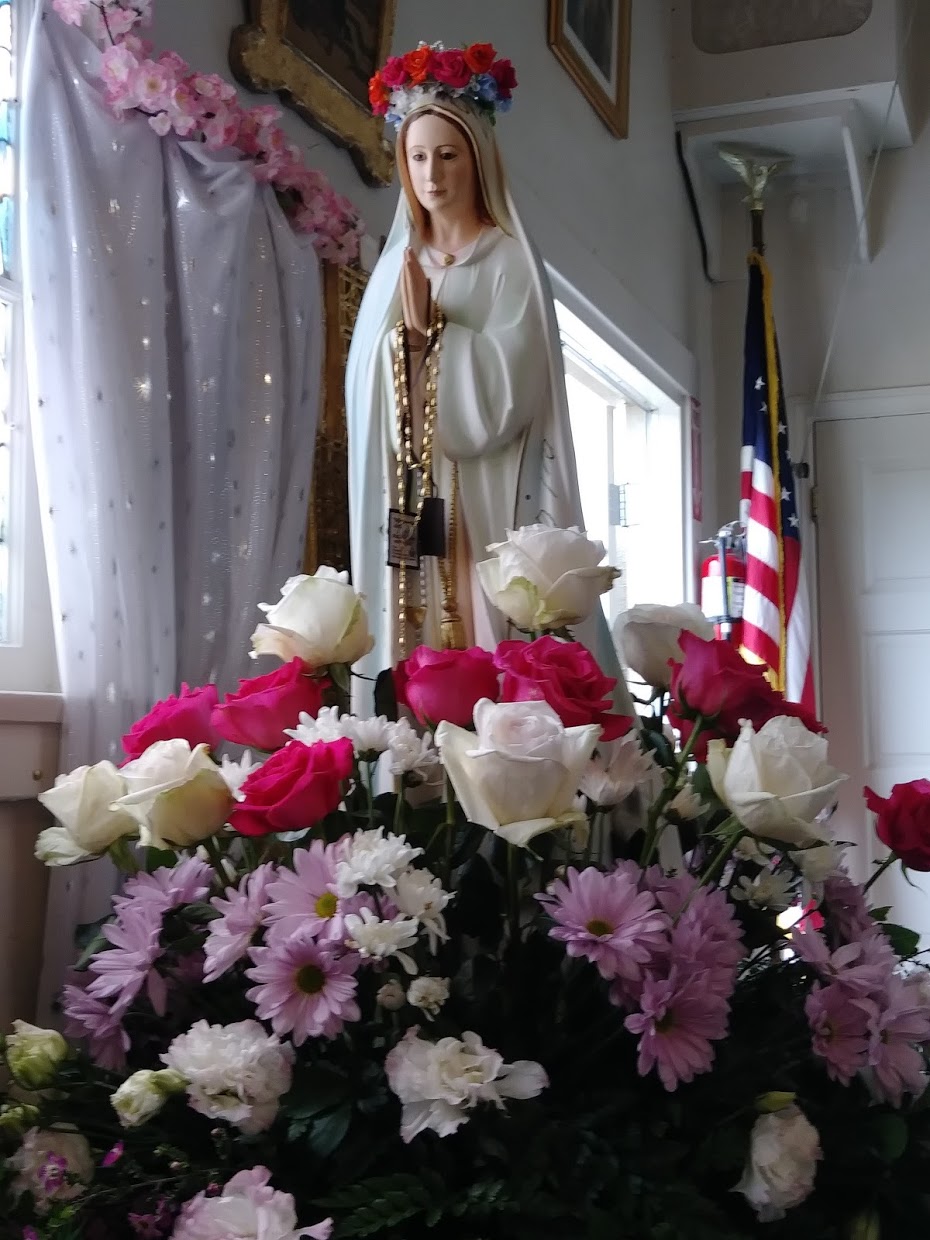 
The following true story explains this well.
The university professor challenged his students
with this question. “Did God create everything
that exists?”
A student bravely replied, “Yes, he did!” “God
created everything?” the professor asked. “Yes,”
the student replied. The professor answered, “If
God created everything, then God created evil
since evil exists, and according to the principle
that our works define who we are, then God is
evil.”
The student became quiet before such an answer.
The professor was quite pleased with himself and
boasted to the students that he had proven once
more that the Christian faith was a myth. At that
point, another student raised his hand and said,
“Can I ask you a question professor?” “Of
course,” replied the professor.
The student stood up and asked, “Professor does
cold exist?” “What kind of question is this? Of
course it exists. Have you never been cold?”
The students snickered at the young man’s
question. The young man replied, “In fact sir,
cold does not exist. According to the laws of
physics, what we consider cold is in reality the
absence of heat. Absolute zero (-460 degrees F)
is the total absence of heat; all matter becomes
inert and incapable of reaction at that
temperature. Cold does not exist. We have
created this word to describe “the absence of
heat.”
The student continued. “Professor, does darkness
exist?” The professor responded, “Of course it
does.”
The student replied, “Once again you are wrong
sir, darkness does not exist either. Darkness is
in reality the absence of light. You cannot
measure darkness. A simple ray of light can break
into a world of darkness and illuminate it. How
can you know how dark a certain space is? You
measure the amount of light present. Isn’t this
correct? Darkness is a term used by man to
describe what happens when there is no light
present.”
Finally the young man asked the professor. “Sir,
does evil exist?” Now uncertain, the professor
responded, “Of course! We see it every day.
It is in the daily example of man’s inhumanity to
man. It is in the multitude of crime and violence
everywhere in the world. These manifestations are
nothing else but evil.”
To this, the student replied, “Evil does not exist
sir, or at least it does not exist in itself.
Evil is simply the absence of God. It is just
like darkness and cold, a word that man has
created to describe the absence of God. God did
not create evil. Evil is not like faith, or love
that exist just as does light and heat. Evil is
the result of what happens when man does not have
God’s love present in his heart. It’s like the
cold that comes when there is no heat or the
darkness that comes when there is no light.” The
professor sat down.
The young man’s name – Albert Einstein.
May Crowning
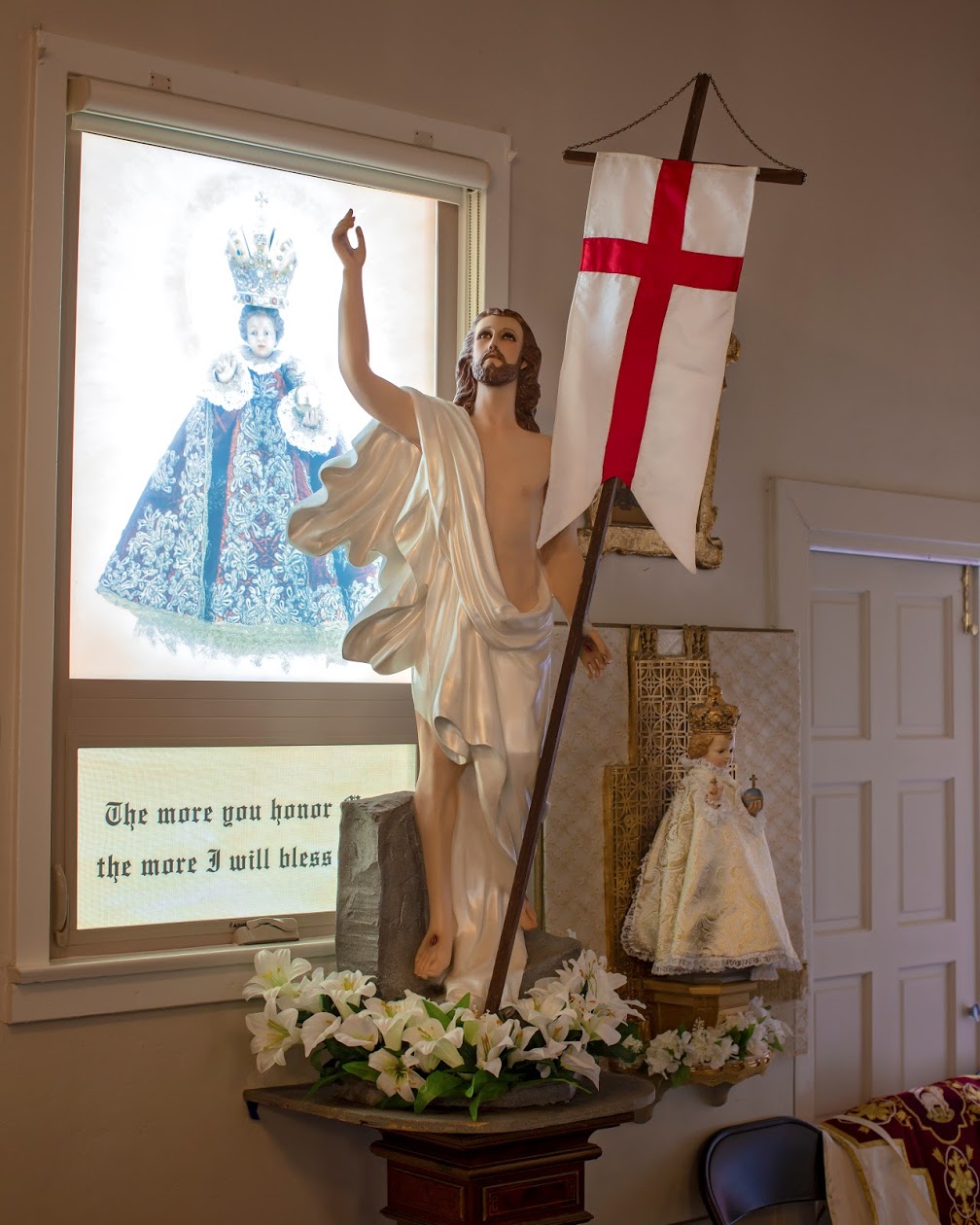
Queen of Angels Easter
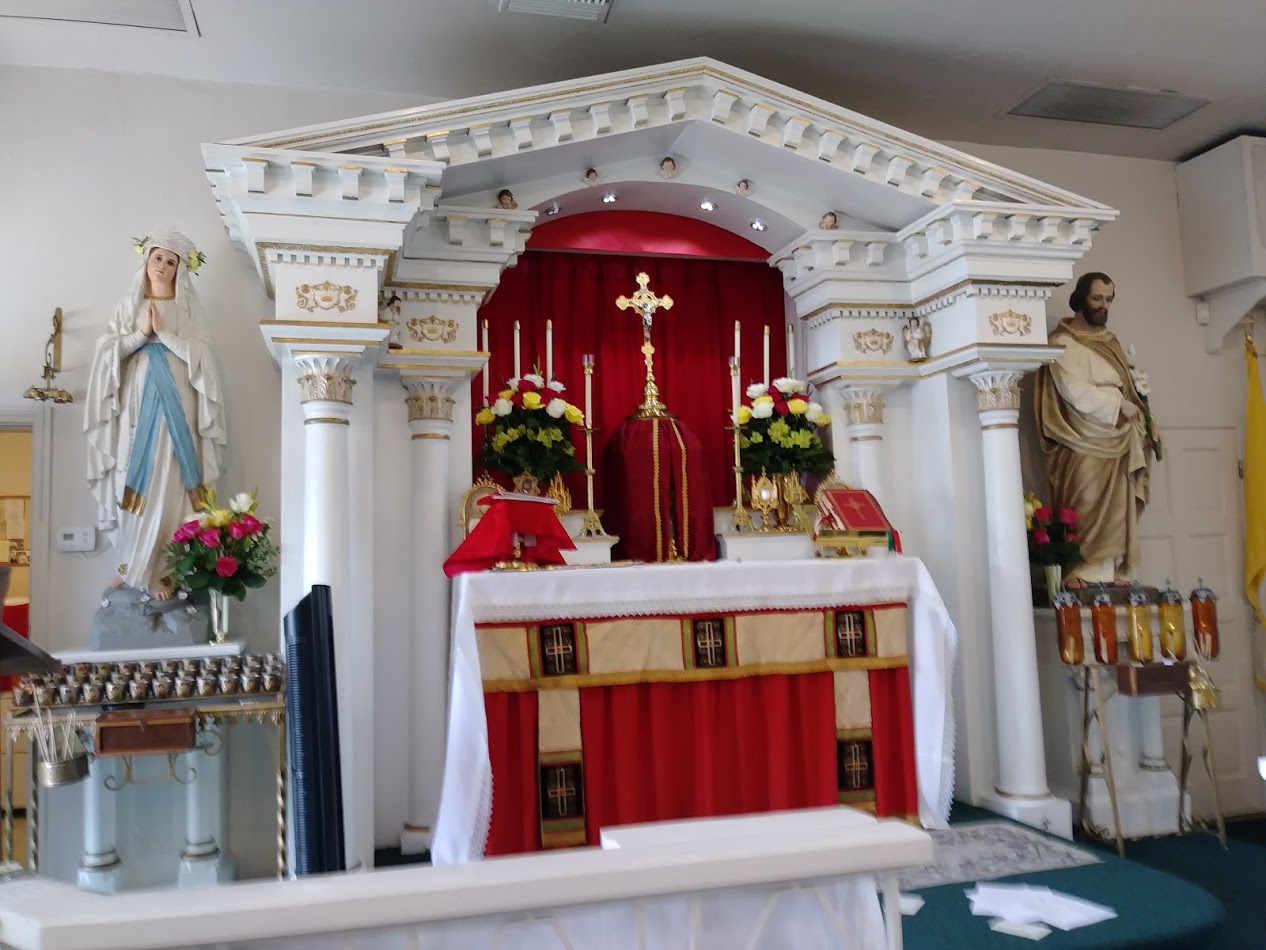
Queen of Angels Altar
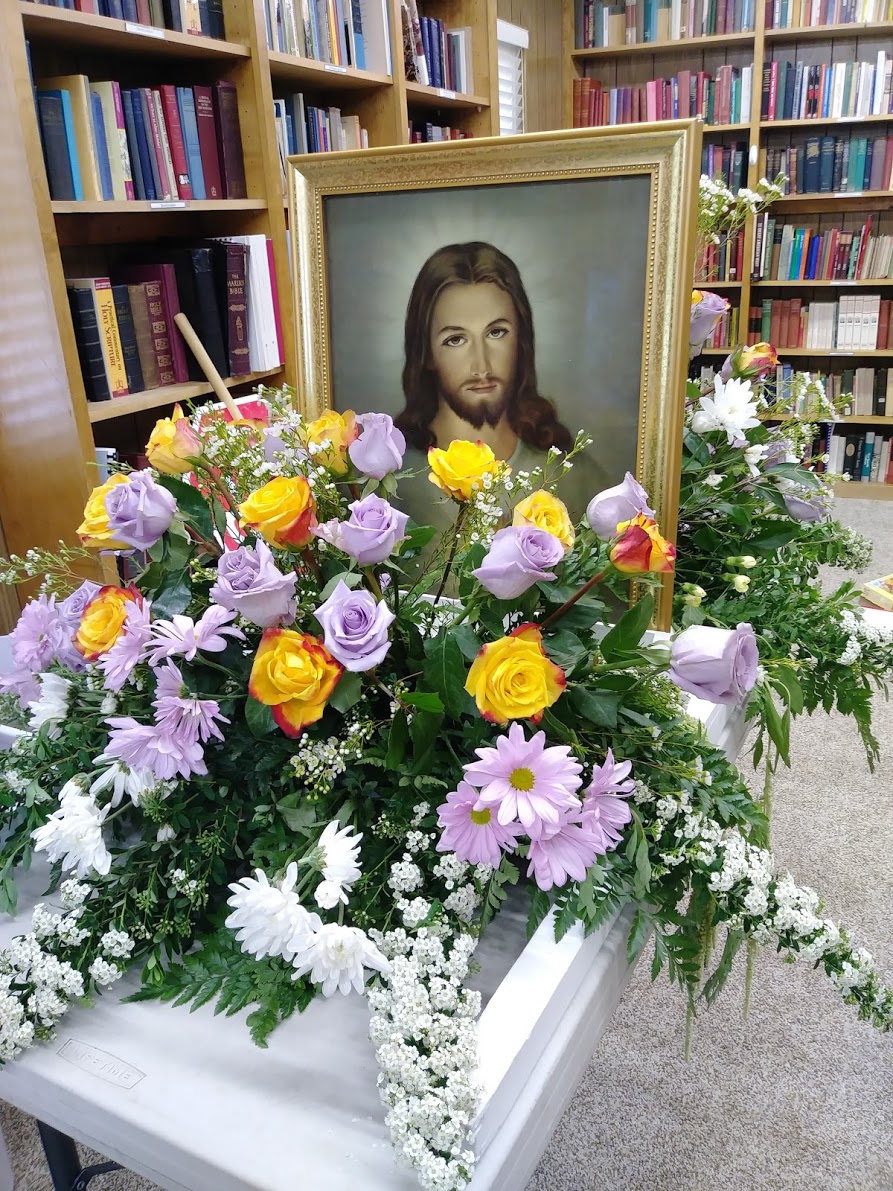
Queen of Angels May Procession
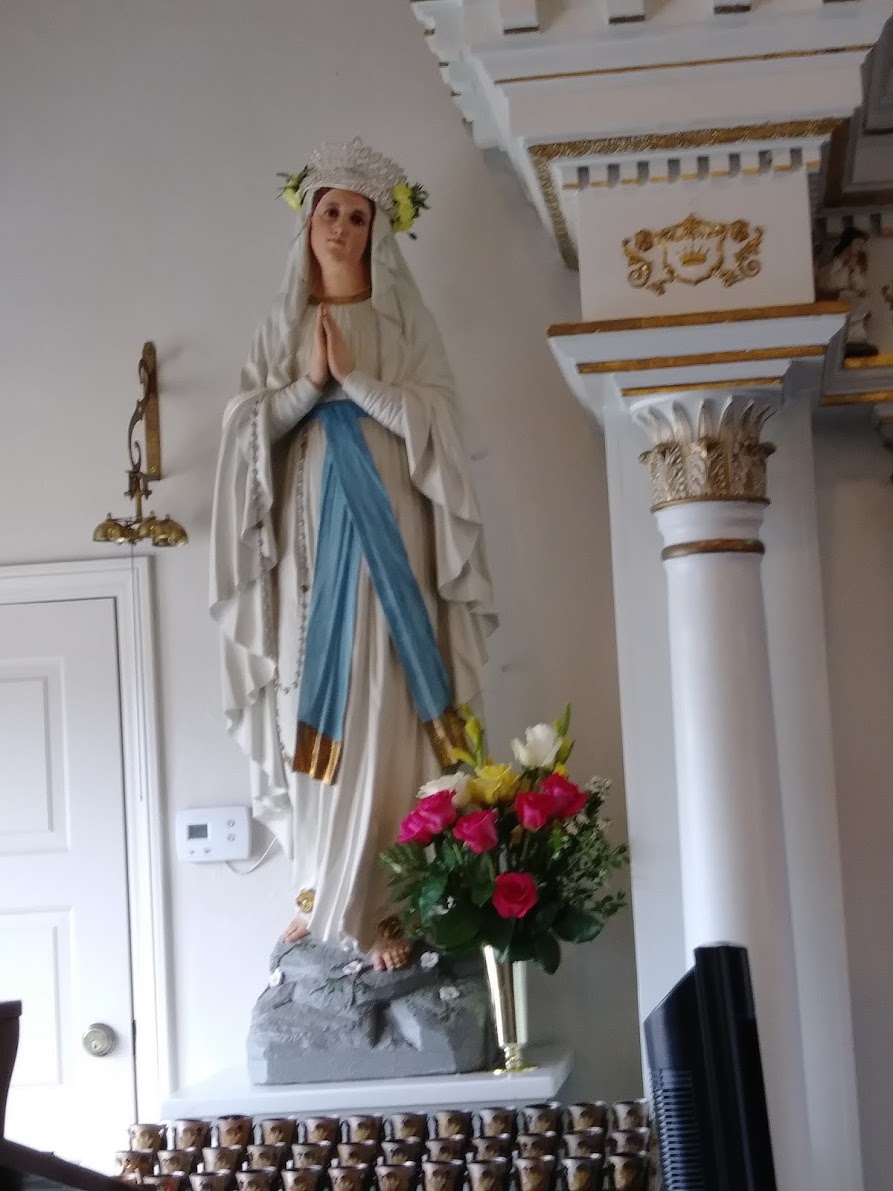
May Crowning

Prayer
The time may be delayed, the
manner may be unexpected, but the answer is sure
to come.
Not a tear of sacred sorrow, not a breath of holy
desire poured out to God will ever be lost, but in
God's own time and way will be wafted back again
in clouds of mercy and fall in showers of
blessings on you and on those for whom you pray.
|

Weekly Sermons
Latest Sermon: click_here
List of Previous Sermons:
click_here

General Information
Baptisms: One
parent and the sponsors must be practicing
Catholics who attend only the Traditional Latin
Mass. Call the pastor to make arrangements.
Confessions:
Sundays - one hour before Mass.
Weekdays - 10 minutes before Mass.
1st Friday and 1st Saturday -
during the Rosary.
Communion for the Sick:
Inform Father if you are unable to attend
Mass and wish to receive Holy Communion and/or
Extreme Unction.
Marriages
For registered members of Queen of Angels
parish only. Please contact the rectory at least
six months prior to the wedding date for marriage
instructions.
Mass Intentions:
If you would like to have Holy Mass
offered for your intention, please use the
envelopes provided in the back of the church. The
customary offering is $25.00. Mass requests are
honored in the order in which they are received.
If you wish a Mass offered on a particular day, it
must be submitted at least a month in advance.
Mass requests for special days will be honored
when possible.
First Holy Communion Classes:
Classes are held every Sunday at 12:30
PM.

Prayers For Rain
O God, in Whom we live, move and
have our being, grant us seasonable rain, so that
our temporal needs being sufficiently supplied, we
may seek with greater confidence after things
eternal.
Be appeased, we beseech Thee, O Lord, by the gifts
which we offer, and garnt us in season the
blessing of sufficient rain.
Grant us, we beseech Thee, O Lord, beneficial rain
and deign to pour out showers from Heaven upon the
parched face of the earth. Through Our Lord Jesus
Christ, Thy Son, Who liveth and reigneth with Thee
in the unity of the Holy Ghost. God, world without
end. Amen
|

First Communion
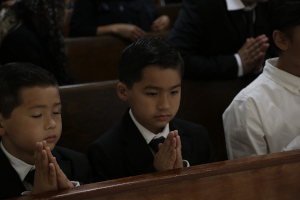 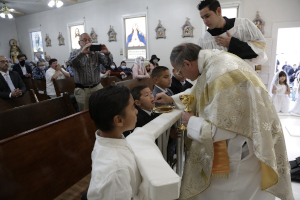 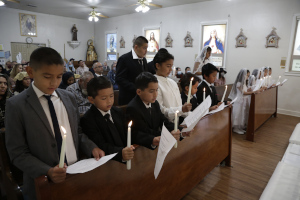 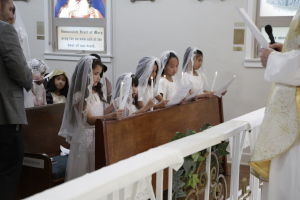 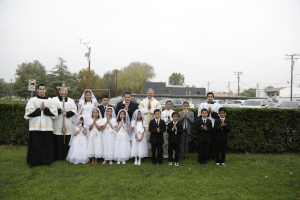
Confirmation
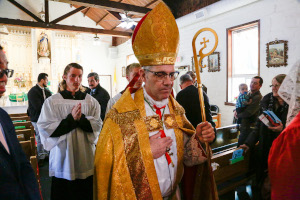 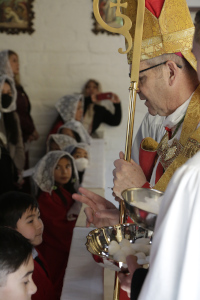 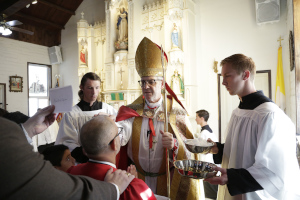 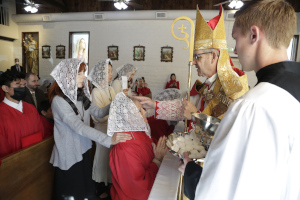 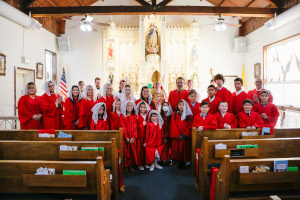
Corpus Christi
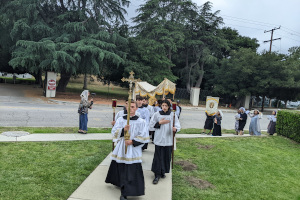 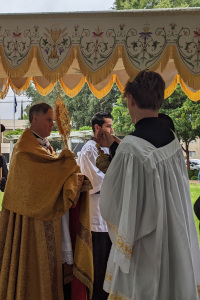 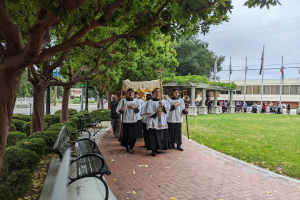
Summer Camp
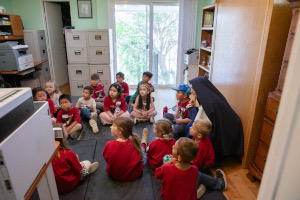 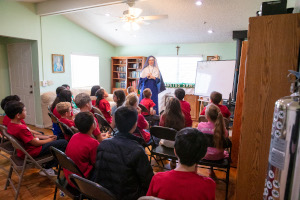 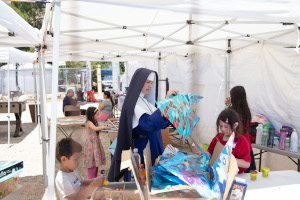
|
|
|



















